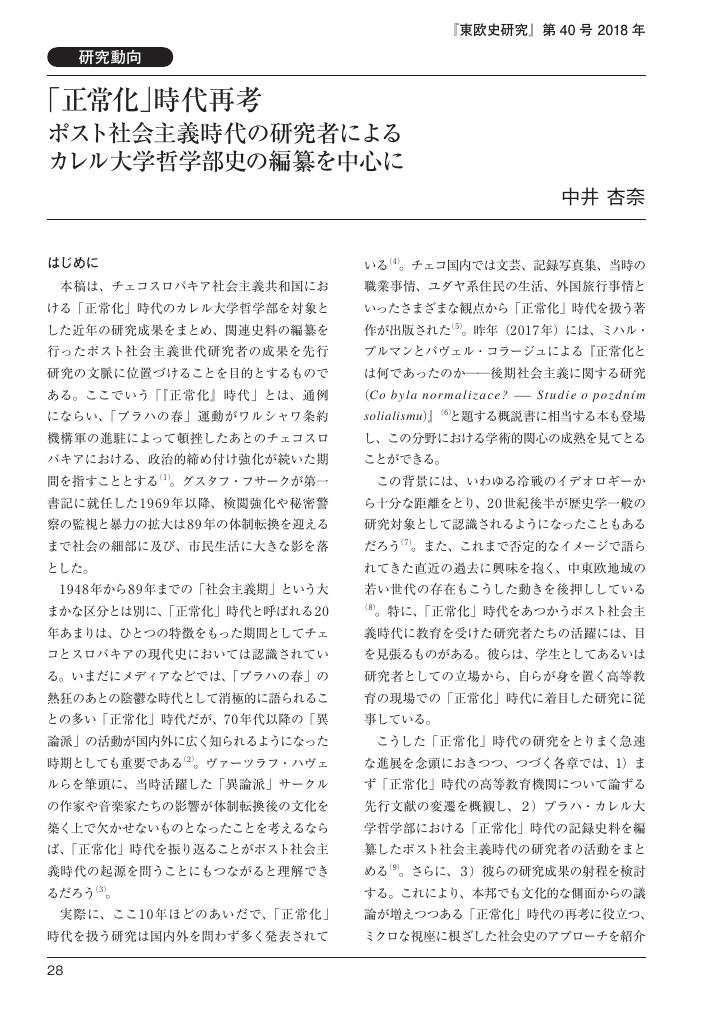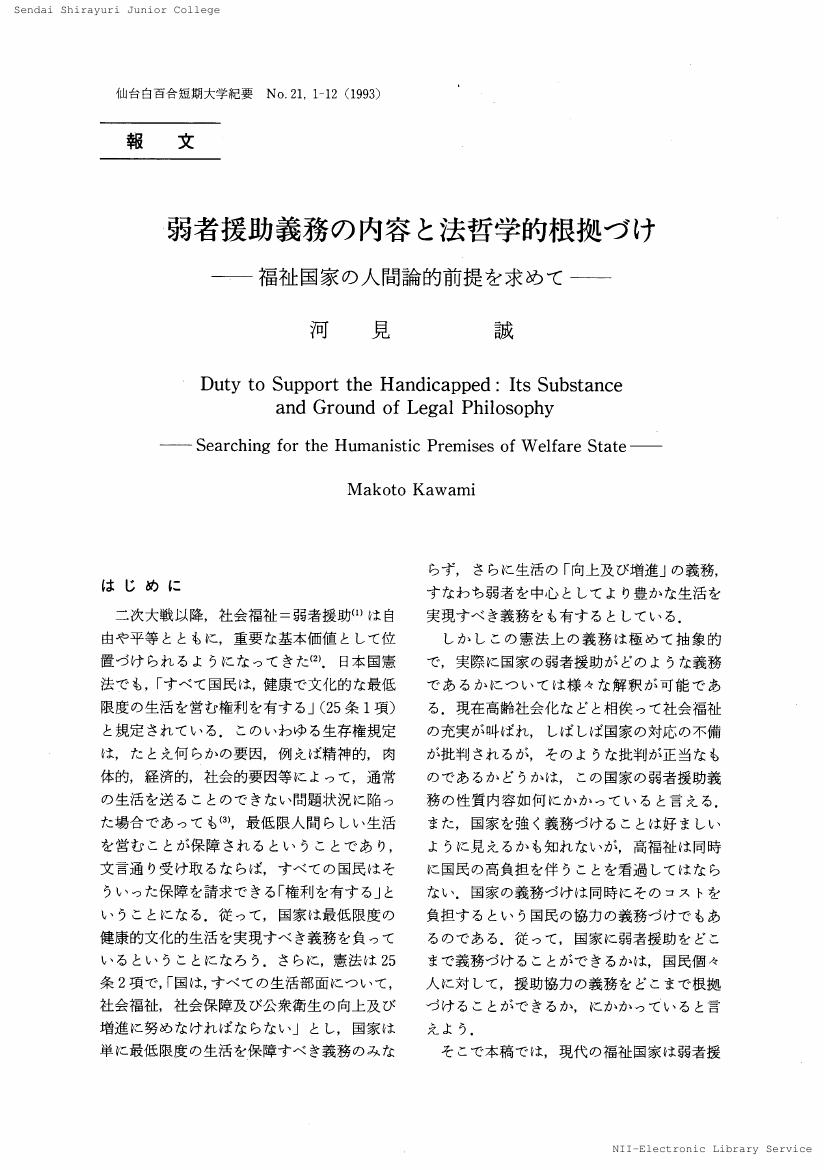5 0 0 0 OA 臨床からの問い : 「統計学の哲学」序説
- 著者
- 出口 康夫
- 出版者
- 京都大学
- 雑誌
- 京都大學文學部研究紀要 (ISSN:04529774)
- 巻号頁・発行日
- vol.44, pp.A41-A84, 2005-03-31
この論文は国立情報学研究所の学術雑誌公開支援事業により電子化されました。
5 0 0 0 IR エネルギー保存則は保存される--一九三〇年代半ばにソ連において行われた哲学論争の再考
- 著者
- 金山 浩司
- 出版者
- 東京大学教養学部哲学・科学史部会
- 雑誌
- 哲学・科学史論叢 (ISSN:13446185)
- 巻号頁・発行日
- no.9, pp.65-89, 2007
- 被引用文献数
- 1
哲学のあり方という根本的な部分で対比されるプラトン(ソクラテス)とソクラテス以前は、その思索のあらゆる点において対立するわけではないし、むしろ、プラトン独自の哲学観の枠内で積極的に受容されることにより、その哲学の形成において非常に大きな影響を与えており、また、たとえ対立するとしても、その対立自体が今度はプラトンの新たな思索の形成の契機となっている。例えば、継承という点で言えば、何よりもまずエレアのパルメニデスを挙げなければならないだろう。プラトンは彼を父親と呼び、真理と思わくの二分法や、真実在についての概念など、彼に多くのものを負っているし、後期対話篇では彼との対話を試みている。そこでは「父親殺し」と称される有論が展開されているが、それは決して「父親」の教説を全否定するものではなく、むしろプラトンの有論の揺るぐことのない基盤となっているのである。また、プラトンの認識論における知性と感覚(そして真理と思わく)は、言うまでもなくプラトンにおいて初めて明確に表明された対立概念ではない。むしろ、クセノパネス以後の認識論の展開の中で、慣習的通念や経験の曖昧さ(その対局には神的知識が想定されている)が徐々に自覚され、ピロラオス、そして原子論者のデモクリトスにおいてようやく明確な形で価値的に峻別されることになったのであり、プラトンの感覚と知性に対する見解はその延長線上にあるのである。さらにまた、アナクサゴラスの自然学がプラトンの魂や分有概念に与えた影響も見逃せない。このように、プラトン哲学の基底においてソクラテス以前哲学者は、肯定的な形であれ、否定的な形であれ、きわめて重大な要素をなしているのである。
5 0 0 0 OA ライプニッツの連続性の哲学
- 著者
- 竹村 瑞穂 重松 大 小林 大祐
- 出版者
- 日本体育・スポーツ哲学会
- 雑誌
- 体育・スポーツ哲学研究 (ISSN:09155104)
- 巻号頁・発行日
- vol.33, no.1, pp.27-40, 2011 (Released:2012-12-17)
- 参考文献数
- 9
The purpose of this paper is to explore the ground for putting a ban on doping in competitive sport circles, especially focusing on the doping problem as “the issues of that with free will”. The IOC and also some researchers have suggested the reason for prohibiting doping but it's still quite contentious.The object and methods in this paper are as follows: We consider “the issues of doping with free will” (object) in the way of applied ethics with four ethical theories as the framework for researching. The adopted frameworks are as bellow (method).1) the theory of virtue2) the theory of liberalism3) the theory of utilitarianism4) the theory of dutyWe can find some prior views about the topic in terms of the theory of virtue andliberalism, whilethe views based on the theory of utilitarianism and duty are our original one.It would be clarified that the view of virtue doesn't make sense and the view of utilitarianism can only show the prospective judgment. The limit of the theory of liberalism and the significance of the theory of duty would also be shown in this paper as a conclusion.Arguments on the doping issues in terms of the theory of duty, however, are limited on “doping negatively affecting the human body”. It means “doping issues that do no harm to human body in sport” should be treated as different problems that concernwith the essence of sport. Finally, we will suggest that both “the bioethical research” and “the philosophy of sport” should be pursued in the research on doping issues.
4 0 0 0 OA 「正常化」時代再考 ポスト社会主義時代の研究者によるカレル大学哲学部史の編纂を中心に
- 著者
- 中井 杏奈
- 出版者
- 東欧史研究会
- 雑誌
- 東欧史研究 (ISSN:03866904)
- 巻号頁・発行日
- vol.40, pp.28-39, 2018 (Released:2022-02-13)
4 0 0 0 OA 歓待と差別 近世フランス王国における外国人の処遇をめぐる言説
- 著者
- 見瀬 悠
- 出版者
- 公益財団法人 史学会
- 雑誌
- 史学雑誌 (ISSN:00182478)
- 巻号頁・発行日
- vol.131, no.8, pp.1-36, 2022 (Released:2023-08-20)
本稿は、近世フランス王国で外国人の処遇に関する規範的言説がどのように変化したのかを明らかにするために、宗教戦争期から「啓蒙の世紀」にかけての主要な法学者や哲学者の著作を外国人遺産取得権(外国人の死後財産を国王が取得する権能)に関する記述を中心に分析した。最初に「外国人」という個人のカテゴリーが中世末期から十六世紀にかけていかにして形成されたのかを確認したうえで、十六世紀後半から十七世紀前半にかけて外国人差別法の強化がいかなる法的・政治的理念によって正当化されたのかを分析し、最後にこうした思考の枠組みが自然法思想や啓蒙哲学の発展を背景にいかなる修正を求められるようになったのかを考察した。 その結果、以下の結論が得られた。まず、外国人嫌悪の風潮を背景に、王国外での生まれが生来的な欠陥や政治的忠誠の欠如に結び付けられ、外国人はフランス人とは本質的に異なる「自然的」カテゴリーとみなされた。そのため、外国人差別は「自然」で歓待とは矛盾しないと考えられ、外国人差別法はフランス人に適した法として支持された。しかし、こうした国民主義的な言説は人間共通の本性とそれに基づく権利を主張する自然法思想の発展のなかで異議申し立ての対象となる。相続能力が君主から与えられる特権ではなく人間の基本的な権利であり、国内の実定法だけでなく自然法・国際法にも属すとみなされるようになったことで、啓蒙期には外国人の権利を尊重しない制度はもはや歓待や文明性と両立しなくなるばかりか、国家の繁栄や人類の幸福を阻害する野蛮で不合理なものとして批判された。このように、近世フランス王国の外国人の処遇をめぐる言説の変容は、ルネサンス以降のヨーロッパにおける国家と法、人間と自然の関係に関する法的・政治的思想の変化のなかで理解できる。
4 0 0 0 OA 客観主義 、 合理主義 、 直観主義 ― もう一つの近代イギリス倫理思想史 ―
- 著者
- 柘植 尚則
- 出版者
- 日本イギリス哲学会
- 雑誌
- イギリス哲学研究 (ISSN:03877450)
- 巻号頁・発行日
- vol.45, pp.5-15, 2022-03-20 (Released:2023-12-22)
4 0 0 0 OA アイルランドの哲学・思想 ( 芸術・宗教・科学を含む )
- 著者
- 藤井 陽一
- 出版者
- ロシア・東欧学会
- 雑誌
- ロシア・東欧研究 (ISSN:13486497)
- 巻号頁・発行日
- vol.2015, no.44, pp.70-86, 2015 (Released:2017-08-18)
- 参考文献数
- 69
This article is devoted to examining the formation of Soviet bioethics since the 1970s by focusing on the activities and viewpoints of Ivan Frolov, who played a prominent role in laying the ground-work for this interdisciplinary study, and who would later become an adviser to the General Secretary of the CPSU in the Gorbachev era. In doing so, this paper aims to demonstrate the differences between the Soviet bioethics and that of the Western school of thought, as well as to identify the shortcomings of Frolov’s attempt to establish the field in the USSR. Soon after Trofim Lysenko’s group lost its power in the Soviet academic community in 1964, not only the field of genetics but also eugenics were resurrected with a new look supported by leading-edge molecular biological and genetic engineering; which had hitherto been developed mainly in the West. In 1970, the Soviet journal “Questions of Philosophy” held a round-table discussion chaired by Frolov with the title “Human Genetics, and its Philosophical, Social-Ethical Problems”. There an embryologist, a general geneticist, a demographer, as well as an ethicist and philosophers argued over the social-ethical aspects of science, especially in regard to gene manipulation and neo-eugenics. Today this round-table is regarded as the main origin of the Soviet, —and later— Russian bioethics. Since the 1970s, influenced by a global trend towards regulating recombinant DNA experiments, and opposition to human enhancement, Frolov published his works. These introduced the new world currents in genetic engineering and neo-eugenics; criticised human enhancement from the Marxist paradigm of the “new human”, whose personality must be developed all-roundly; supported the Western scholars, who were struggling against neo-eugenics; and appealed for the necessity of an international approach to controlling biology and genetics. At the same time, the Soviet bio-philosopher developed networks of contacts within UNESCO alongside US bioethics institutes, and gave presentations on the socio-ethical aspects of genome science for those foreign associates. Since the middle of the 1980s until the 1990s, Frolov made attempts to get Soviet bioethics recognised by his Western counterparts, by forming a panel of experts engaged in bioethics in various areas. As a result, Soviet bioethics, based on talks among biologists, doctors, philosophers, lawyers, in addition to an Orthodox priest, was established at the end of 1980s. In April of 1991, the Soviet national bioethics committee was established in the Soviet Academy of Sciences in the wake of Frolov’s appeal to the Presidium. In May, the International Meeting on Bioethics and the Social Consequences of Biomedical Research was held in Moscow under the auspices of UNESCO. Therefore, it is indeed clear that Frolov contributed to the foundation of bioethics in the Soviet academic community, but he failed in his moral obligation to develop an interest in bioethics amongst the general public, and to involve them in the debate, whereas in the West national debates centring on bioethics had been flourishing since the 1970s. The result of Frolov’s ignorance was evident in a 1993 survey, which demonstrated broad support for neo-eugenic treatments by the Russian populace. Now Boris Yudin, Frolov’s successor, highlights the importance of familiarising oneself with this theme and inspiring popular debate on the topic through mass media and education.
4 0 0 0 OA <報文>弱者援助義務の内容と法哲学的根拠づけ : 福祉国家の人間論的前提を求めて
- 著者
- 河見 誠
- 出版者
- 学校法人白百合学園 仙台白百合短期大学
- 雑誌
- 仙台白百合短期大学紀要 (ISSN:02864924)
- 巻号頁・発行日
- vol.21, pp.1-12, 1993 (Released:2018-07-16)
4 0 0 0 OA 飯田隆著『言語哲学大全IV:真理と意味』(勁草書房,2002年)
- 著者
- 山田 友幸
- 出版者
- 日本科学哲学会
- 雑誌
- 科学哲学 (ISSN:02893428)
- 巻号頁・発行日
- vol.37, no.1, pp.77-89, 2004-07-25 (Released:2009-05-29)
This book is the last book of Iida's celebrated series, "Summa". It includes a detailed argument for homophonic semantics and an equally detailed exposition of his truth-conditional semantics for three fragments of Japanese, the third of which contains indexical expressions and tensed verbs. As one might expect, the semantics given for this fragment is far from being homophonic. I will examine what role his argument for homophonic semantics plays in his defense of his non-homophonic semantics. I will also examine how Iida avoids treating moods in his semantics, and point out the need to treat illocutionary acts within semantics.
4 0 0 0 OA 共生思想 VS 優生思想 ――共生教育の哲学的基礎のために
- 著者
- 山脇 直司
- 出版者
- 日本共生科学会
- 雑誌
- 共生科学 (ISSN:21851638)
- 巻号頁・発行日
- vol.9, no.9, pp.76-81, 2018 (Released:2019-06-17)
This article aims at clarifying and enriching the philosophy for inclusive society, opposing eugenic thought, which discriminates human beings by the inequality of ability. For that purpose, I emphasize first the value of fundamental human rights for all people, which Utilitarianism tends to neglect, and second other public values such as cohappiness, compassion and WA that includes the idea of restorative justice.
4 0 0 0 OA 本音を語ることを促すインタビュー技法に関する一考察
- 著者
- 諏訪 正樹 清水 唯一朗
- 出版者
- 一般社団法人 人工知能学会
- 雑誌
- 人工知能学会全国大会論文集 第28回 (2014) (ISSN:27587347)
- 巻号頁・発行日
- pp.2D4OS28a1, 2014 (Released:2018-07-30)
人生哲学を聞き出すインテンシブなインタビュー記録を基に,ライフストーリーのインタビュー技法に関して考察する.話し手が心の中に有する定型の語り口を破り,その場で考えることを促し,本音をしゃべることを促すことが大目標である.インタビュアーが具体的なトピックを提示し,主観的な意見を述べ,仮説を開示するという,従来インタビューでは御法度とされてきた技法が,実は本音を語ることを促す可能性が示唆された.
4 0 0 0 OA 認知言語学と哲学 ―言語は誰の何に対する認識の反映か―
- 著者
- 酒井 智宏
- 出版者
- 日本言語学会
- 雑誌
- 言語研究 (ISSN:00243914)
- 巻号頁・発行日
- vol.144, pp.55-81, 2013 (Released:2022-03-08)
- 参考文献数
- 41
「言語は人間の世界認識の反映である」という認知言語学的な主張(以下,主張P)は次の二つの問題を提起する。(i)人間が何を認識するのか。(ii)誰が世界を認識するのか。(i)に関して,認知言語学では,外的世界と内的世界の二元論が前提とされる。しかし,認知言語学者が外的世界に関する事実と呼ぶものは,実際にはわれわれが解釈したかぎりでの世界の記述にすぎず,同じことを一元論のもとで述べなおすことができる。それゆえ,認知言語学の二元論は十分に正当化されているとは言えない。(ii)に関して,主張Pを受け入れれば,言語間の変異はすべて話者の世界認識の違いによるという結論に至る。しかし,この結論は逆説的にも「話者の認識から独立した意味」という客観主義的意味観を帰結しうる。かくして,主張Pと対照言語学とのあいだに緊張関係が生じることになる。
4 0 0 0 OA 意識の神経基盤と複雑性
- 著者
- 小野田 慶一
- 出版者
- 日本生理心理学会
- 雑誌
- 生理心理学と精神生理学 (ISSN:02892405)
- 巻号頁・発行日
- pp.2204si, (Released:2022-08-27)
- 参考文献数
- 136
- 被引用文献数
- 1 1
意識は長らく哲学や心理学において扱われてきたが,近年漸く神経科学の正当な研究対象として扱われるようになってきた。そこでは意識を科学的に扱うための実験的アプローチや情報理論に基づく数理的研究が進展してきた背景がある。本稿では神経科学における意識研究がどのように意識の問題に取り組んできたかを概観する。さらに意識と脳の複雑性の連関を踏まえた上で,統合情報理論に基づき意識の神経基盤を探求した自身の研究を紹介する。
4 0 0 0 OA 個物が先か,このもの性が先か
- 著者
- 大畑 浩志
- 出版者
- The Philosophy of Science Society, Japan
- 雑誌
- 科学哲学 (ISSN:02893428)
- 巻号頁・発行日
- vol.53, no.2, pp.169-189, 2021-03-31 (Released:2021-03-31)
- 参考文献数
- 27
Haecceitism is the idea that each particular object has a haecceity: the property that determines its uniqueness as an object. Thus, for example, we could say that Socratesʼs haecceity is the property of being (identical with) Socrates. However, haecceitism seems to face the “Haecceitic Euthyphro Problem,” namely, that, especially in the case of fission of an amoeba, it is unclear how to set an explanatory order between the two facts: the destruction or generation of particular objects and the instantiation of their haecceities. In this paper, I distinguish between two versions of haecceitism and address this issue with the version I call “primitivist haecceitism.”
4 0 0 0 OA 講義におけるドゥルーズの教育実践
- 著者
- 西川 耕平
- 出版者
- 日仏哲学会
- 雑誌
- フランス哲学・思想研究 (ISSN:13431773)
- 巻号頁・発行日
- vol.27, pp.47-58, 2022-09-01 (Released:2022-10-01)
4 0 0 0 OA 大正期を生きた池田亀鑑 ――「知」と「感」の相克の背景――
- 著者
- 吉野 瑞恵
- 出版者
- 日本文学協会
- 雑誌
- 日本文学 (ISSN:03869903)
- 巻号頁・発行日
- vol.61, no.5, pp.33-43, 2012-05-10 (Released:2017-11-02)
『源氏物語大成』に結実する『源氏物語』の文献学的な研究で知られる池田亀鑑は、『宮廷女流日記文学』においては、主情的な評論を試みており、両者は鮮やかな対照をなしている。彼のこのような二面性は、個人的な資質による面もあったが、さらに、池田が人間形成をした大正期に哲学・芸術・文学・社会運動などあらゆる領域を席巻した「生命主義」とも呼ばれる大きな潮流の影響を考える必要がある。池田という研究者は、大正期という時代の新しい流れに反応し、この時代に文学研究をめぐって浮上してきた問題を引き受けて、一生を送ったといえるのである。
4 0 0 0 OA フーコーにおけるテクノロジーと倫理 : セクシュアリティの概念をめぐって
- 著者
- 杉山 吉弘
- 出版者
- 北海道大学哲学会
- 雑誌
- 哲学 (ISSN:02872560)
- 巻号頁・発行日
- vol.40, pp.65-80, 2004-07-18



